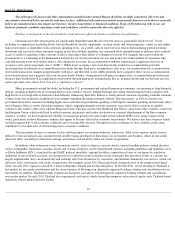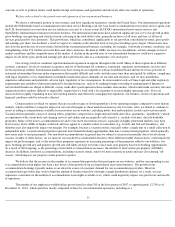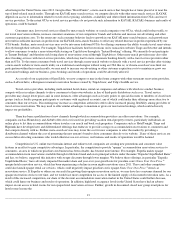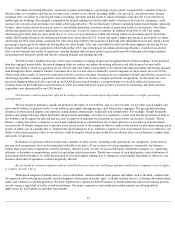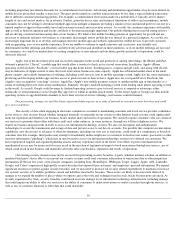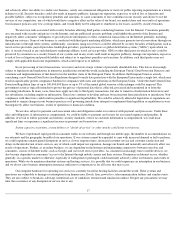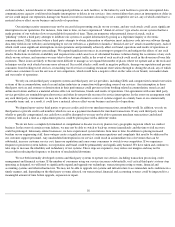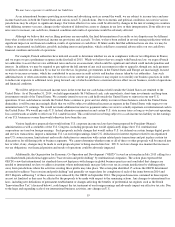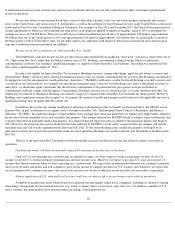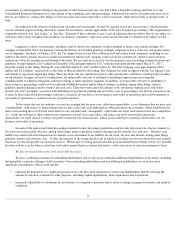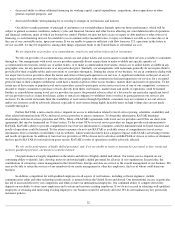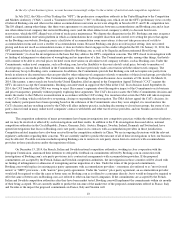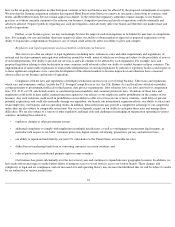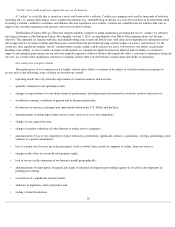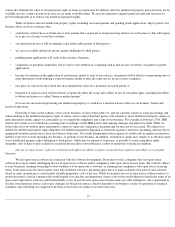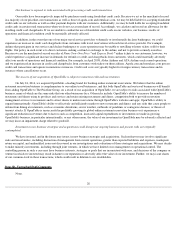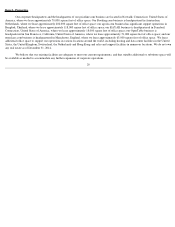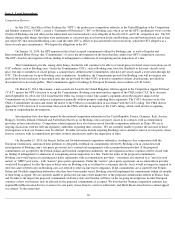Priceline 2014 Annual Report Download - page 24
Download and view the complete annual report
Please find page 24 of the 2014 Priceline annual report below. You can navigate through the pages in the report by either clicking on the pages listed below, or by using the keyword search tool below to find specific information within the annual report.
or international taxation of our activities may increase our worldwide effective tax rate and could adversely affect our financial position and
results of operations.
We are also subject to non-income based taxes, such as value-added, payroll, sales, use, net worth, property and goods and services
taxes, in the United States and various non-
U.S. jurisdictions, as well as the potential for travel transaction taxes in the United States as discussed
below and in Note 16 to our Consolidated Financial Statements. For example, in July 2012 and December 2013, the Dutch Government enacted
certain amendments to Dutch tax law including one-time levies on an employer applied to employee earnings, equal to 16% of an employee's
earnings in excess of 150,000 Euros. These irrevocable levies resulted in additional payroll taxes of approximately $12 million (approximately
$9 million after tax) in the fourth quarter of 2013 and approximately $14 million (approximately $10 million after tax) principally recorded in
the third quarter of 2012. From time to time, we are under audit by tax authorities with respect to these non-income based taxes and may have
exposure to additional non-income based tax liabilities.
We may not be able to maintain our "Innovation Box Tax" benefit.
The Netherlands corporate income tax law provides that income generated from qualifying "innovative" activities is taxed at the rate of
5% ("Innovation Box Tax") rather than the Dutch statutory rate of 25%. Booking.com obtained a ruling from the Dutch tax authorities
confirming that a portion of its earnings ("qualifying earnings") is eligible for Innovation Box Tax treatment. This ruling was renewed in July
2013 and is valid through December 31, 2017.
In order to be eligible for Innovation Box Tax treatment, Booking.com must, among other things, apply for and obtain a research and
development ("R&D") certificate from a Dutch governmental agency every six months confirming that the activities that Booking.com intends to
be engaged in over the subsequent six month period are "innovative." The R&D certificate is current but should Booking.com fail to secure such
a certificate in any future period - for example, because the governmental agency does not view Booking.com's new or anticipated activities as
innovative - or should this agency determine that the activities contemplated to be performed in a prior period were not performed as
contemplated or did not comply with the agency's requirements, Booking.com may lose its certificate and, as a result, the Innovation Box Tax
benefit may be reduced or eliminated. Booking.com intends to apply for continued Innovation Box Tax treatment for future periods. However,
Booking.com's application may not be accepted, or, if accepted, the amount of qualifying earnings may be reduced or the applicable tax rate on
qualifying earnings may be higher than the current rate.
In addition, the tax law may change resulting in a reduction or elimination of the tax benefit. As discussed above, the OECD's action
plan involves, in part, evaluation of tax regimes such as the Innovation Box Tax. The European Union Council of Economics and Finance
Ministers ("ECOFIN") has endorsed changes to limit member states' existing innovation and patent box tax regimes providing benefits related to
profits derived from intangible assets such as intellectual property. The changes endorsed by ECOFIN would, if adopted, limit such benefits only
to profits derived from patentable intellectual property. It is expected that the legislative process related to the proposed changes will begin in
2015. However, the proposals may not be adopted in the form endorsed by ECOFIN or at all, and it is expected that any changes will include
transition rules and will be fully implemented no later than July 2021. To the extent Booking.com's intellectual property developed by its
innovative activities do not meet the requirements under any new legislation, Booking.com would eventually lose the benefit of the Innovation
Box Tax.
The loss of the Innovation Box Tax benefit would substantially increase our effective tax rate and adversely impact our results of
operations.
Our financial results will likely be materially impacted by payment of income taxes in the future.
Until our U.S. net operating loss carryforwards are utilized or expire, we do not expect to make tax payments on most of our U.S.
income, except for U.S. federal alternative minimum tax and state income taxes. However, we expect to pay non-U.S. taxes on our non-U.S.
income other than in countries where we have operating loss carryforwards. We expect that our international business will continue to generate
most of our revenues and profits and will continue to grow pretax income at a higher rate than our U.S. business and, therefore, we expect that
our tax payments will continue to increase. Any increase in our effective tax rate would have an adverse effect on our results of operations.
Adverse application of U.S. state and local tax laws could have an adverse effect on our business and results of operations.
A number of jurisdictions in the United States have initiated lawsuits against online travel companies, including us, related to, among
other things, the payment of travel transaction taxes (e.g., hotel occupancy taxes, excise taxes, sales taxes, etc.). In addition, a number of U.S.
states, counties and municipalities have initiated audit proceedings, issued proposed tax
20


